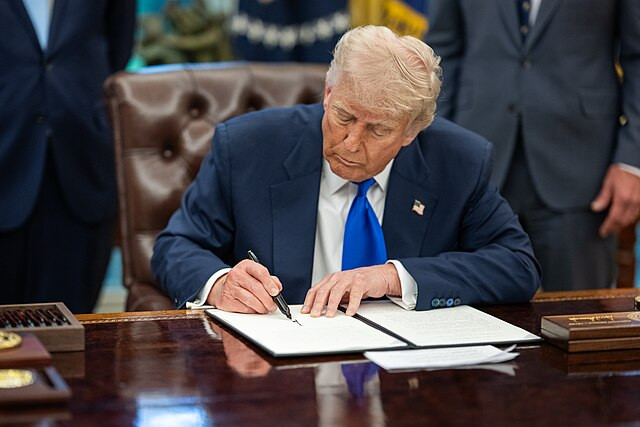President Donald Trump announced Friday that he has signed tariff letters to 12 countries, signaling a renewed escalation in his global trade offensive. The letters, which specify the import duties each nation would face, are set to be dispatched Monday. Trump said the tariffs will take effect August 1 unless bilateral agreements are reached beforehand.
"I signed some letters and they'll go out on Monday, probably twelve," Trump told reporters aboard Air Force One en route to New Jersey. "Different amounts of money, different amounts of tariffs and somewhat different statements."
The president declined to identify which countries will receive the letters, though he had previously pledged "90 deals in 90 days" following a sweeping tariff regime unveiled in April. That plan included a 10% baseline rate with additional levies reaching up to 50% for many nations. Following market volatility, Trump suspended the added tariffs for 90 days to allow for negotiations. That pause expires July 9.
Speaking at Joint Base Andrews earlier in the day, Trump warned the new tariffs could be as high as 70%. "They'll range in value from maybe 60 or 70 percent tariffs to 10 and 20 percent tariffs, but they're going to be starting to go out sometime tomorrow," he said. "We've done the final form, and it's basically going to explain what the countries are going to be paying in tariffs."
Treasury Secretary Scott Bessent said in a CNBC interview Thursday that while few deals have been finalized, there is still time. "Of course, everyone waits till the last minute," Bessent said. "These countries should be careful because their rate could boomerang back to their April 2 rate."
So far, only a limited number of agreements have been completed. The U.K. reached a deal in May to retain a 10% rate and secure favorable terms for key industries, including autos and aerospace. Vietnam's deal reduced its tariff rate to 20% from a previously threatened 46%, and allows U.S. goods into Vietnam duty-free.
Negotiations with other trading partners have faltered. EU diplomats said Friday they had failed to reach an agreement with Washington and are now seeking an extension to avoid sudden tariff hikes. A deal with India, once touted as imminent, has also stalled.
European Commission President Ursula von der Leyen addressed the timeline constraints during a news conference, saying, "Indeed what we are aiming at is an agreement in principle, because [with] such a volume, in 90 days, an agreement in detail, it's impossible."
Markets reacted swiftly to Trump's tariff announcement. European stocks and U.S. futures dipped Friday as investors anticipated renewed trade friction. Business groups warned that a return to escalating tariffs would reverse months of relative calm in global trade.
Trump, who has repeatedly expressed frustration with multilateral trade talks, appeared to favor the direct approach. "I think the letters are better for us; I've said that all along," he said. "Because you have hundreds of countries, you know, you have over 200 countries and you can't sit down with 200 countries."






